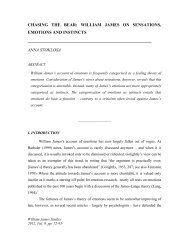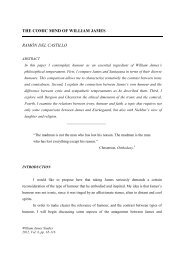POLITICS IN THE PLURIVERSE. By Kennan Ferguson
POLITICS IN THE PLURIVERSE. By Kennan Ferguson
POLITICS IN THE PLURIVERSE. By Kennan Ferguson
You also want an ePaper? Increase the reach of your titles
YUMPU automatically turns print PDFs into web optimized ePapers that Google loves.
REVIEWS 134<br />
neither the bristling challenge that pluralism undermines pragmatism nor the standard<br />
view that pluralism flows from pragmatism, but rather the sensible idea that pluralism can<br />
proceed where pragmatism is not already in place in such a way as to prepare us for the<br />
latter.<br />
<strong>Ferguson</strong>’s book opens in Chapter One with a recounting of James’s visit to the<br />
utopian community of Chautauqua in upstate New York. James recognized in<br />
Chautauqua an American iteration of sweetness and light. But flowing out of those<br />
perpetually running soda water fountains was a slow and steady decay. With everything<br />
so well prepared for the visitor, there was nothing for the visitor to do except to atrophy<br />
into a readymade routine. <strong>Ferguson</strong> suggests that we find the paradigmatic motivation<br />
for James’s pluralism in his reaction against the hotel world of Chautauqua where<br />
struggle is not only unnecessary but also impossible.<br />
This sets the stage for the end of Chapter One and Chapter Two where <strong>Ferguson</strong><br />
contrasts Jamesian pluralism to contemporary liberal pluralism. This is the core of the<br />
book for it is here that we find the crux of <strong>Ferguson</strong>’s interpretation of James’s politics<br />
and the contribution it can make to political theory today: “liberal pluralism and James’s<br />
radical pluralism are distant cousins” (9). At the core of <strong>Ferguson</strong>’s contrast here is an<br />
interpretation of contemporary liberalism as a theory that accepts plurality but with the<br />
goal of subsuming it within greater unity. Is this an accurate interpretation of liberalism<br />
today?<br />
If <strong>Ferguson</strong> is right that contemporary liberals countenance pluralism only as a<br />
descriptive fact to be overcome by a wider norm of political unity, then surely James<br />
helps us go beyond this. But we should consider at this point exactly what part of such a<br />
liberalism James presses past. <strong>Ferguson</strong> suggests that James moves past the descriptive<br />
pluralism of the liberal in that he not only describes pluralism but more importantly<br />
prescribes it (cf. 10, 15ff.). Yet I find it tough to see how anyone could coherently<br />
prescribe pluralism: for there are always doctrines which demand the cessation of some<br />
other doctrines (e.g., evangelism towards atheism) and so prescribing pluralism requires<br />
ruling such doctrines out, even though pluralism was supposed to rule nothing out, but<br />
invite all in (this, by the way, is also Talisse’s argument).




